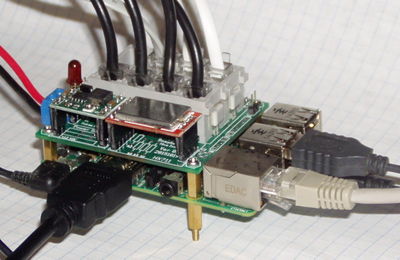Difference between revisions of "Change: Interface PCB"
(→Background) |
(→Background) |
||
| Line 1: | Line 1: | ||
[[File:P1010016c.jpg|thumb|400px|Dev Kit PCB installed on a Pi 2.]] | [[File:P1010016c.jpg|thumb|400px|Dev Kit PCB installed on a Pi 2.]] | ||
==Background== | ==Background== | ||
| − | A Printed Circuit Board (PCB) has been designed and manufactured. | + | A Printed Circuit Board (PCB) has been designed and manufactured. This is an interim solution - a step towards the goal of a complete turnkey system. |
| − | + | *All sensor plug in. | |
| − | + | *12 VDC power supply with battery voltage monitoring | |
| − | |||
| − | |||
| − | + | The goals were to | |
| − | + | #make it quicker and easier to build a system and to make it more reliable. | |
| − | + | #to establish a relationship with a board house. | |
| + | #to select an open source pcb layout package and learn how to use it. | ||
| + | #to test the footprint of the RJ connectors and mating with the Pi. | ||
==Problems== | ==Problems== | ||
Revision as of 03:50, 14 December 2015
Background
A Printed Circuit Board (PCB) has been designed and manufactured. This is an interim solution - a step towards the goal of a complete turnkey system.
- All sensor plug in.
- 12 VDC power supply with battery voltage monitoring
The goals were to
- make it quicker and easier to build a system and to make it more reliable.
- to establish a relationship with a board house.
- to select an open source pcb layout package and learn how to use it.
- to test the footprint of the RJ connectors and mating with the Pi.
Problems
- ADC is only one channel.
- No Real Time Clock (RTC).
- Board does not meet Pi HAT specification.
- Board is not general purpose but limited to our use.
Proposed change
Split this board in two, Board A and Board B.
- Board A will be a general purpose interface board that meets the Pi HAT specifications and contains:
- at least one 4 channel ADC so each load cell will be individually measured instead of being summed.
- Real Time Clock with battery backup.
- Configuration ROM
- Power supply
- Board B will have all the connectors installed in a bulkhead configuration. It will connect to Board A by directly plugging into a header on Board A or connect via a ribbon cable.
